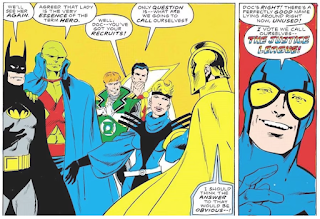As a follow-up to my post on pulp teams, I thought I would address the perhaps more common issue of teams in supers rpgs. As with superhero character concepts, I admit to some dissatisfaction at times with the sort of teams that get built by players in supers games. There's nothing wrong with the superhero formulation of Reints' old high concept pitch of D&D about Conan and Gandalf fighting Dracula, but just as most everybody's (or at least a lot of people's) D&D isn't so eclectic, I don't see any reason why every supers campaign needs to permit playing Golden Age Sandman (Vertigo version) and Witchblade versus the Beyonder.
Having a team that really feels like it fits goes beyond just identifying what supers subgenre or style (Four Color, Golden Age mystery men, realistic, gritty, etc.) is going to the subject of play, though I think that's probably the first step. Before we considering other things, I want to talk about superhero teams as they occur in comics. I think there are three broad categories:
- The Band: A small group (3-6, maybe) of disparate members thrown together for some reason. Their dynamics are more based on tropes around specific personalities/story roles rather than anything else (see the tvtropes articles like Four Temperament Ensemble, Four Philosophy Ensemble, and Five Man Band, among others), though they sometimes have a theme (elements being common). Examples: The Fantastic Four, The Challengers of the Unknown, the original Teen Titans, the original X-Men.
- The Supergroup: Solo characters who come together as a team. Neither their powers or their personalities tend to be coordinated, but they bring individual histories and backstories with them. One or more Supergroup tends to be a big deal in most comic universes, but not all of them. The building up to the formation of one might be short campaign itself. Examples: the Avengers, The Justice League, the Mighty Crusaders.
- The Ensemble: Purpose-built groups of new or mostly new characters. They are typically attempts to create something of a Supergroup (but without the characters being previously established) or a band (but with so many members they can't all get a distinct, stock personality). They tend to have power portfolios that are easily understandable in terms of combat/team roles (the Brick, the Blaster, etc.) and often sport really on the nose codenames. Examples: The Authority, Youngblood, the new X-Men, the Outsiders (original team), Squadron Supreme.
Assembling Your Avengers (or what have you)
Creating a Band or Ensemble is pretty easy, it just requires coordinating character creation. Once the general subgenre, style, and tone is agreed on, players can discuss concepts to either get personalities or powers/roles divvied up.
It might seem as if a rpg superhero team of newly minted characters could only ever be a Band or an Ensemble. That's true in the literal sense, but I think things can be done to sort of replicate the feel of a Supergroup, if that's what you want to do. It requires coming up with more about the characters than just their name and powers, however.
Emergent worldbuilding is popular in some circles, and I think a supers campaign can certainly be done that way, but I think it's bound to be less satisfying if a Supergroup is what you're after. Most people, even very creative people, just don't always come up with their best stuff at the spur of the moment. Best is certainly not always required--in fact in a supers game meant to replicate the comics, you probably don't always want your best. But people also don't want to be saddled with ill-considered ideas as important character concepts.
I suggest people take a little time and come up with at least the stuff that would have happened in the first issue (or maybe, in these days of decompression, the first arc) of their character's comic: besides the basics on the character sheet, that would include supporting cast, home base, and at least one antagonist. I actually favor going a little farther and sketching the contents of an original DC Who's Who's/ Official Handbook of the Marvel Universe (not the Deluxe addition, I don't think. Too detailed!) style entry for the character. That still leaves a lot to discover (or backfill in play), but it allows a foundation to credibly kayfabe a character with a history.










2 comments:
I can't think of a single supers RPG that really lends itself to play with a solo PC. Some of them are almost incapable of handling it - Sentinel Comics has a sweet spot of 3-6 players and requires major GM tweaking to run for 1-2 heroes. It's understandable given that roleplaying has traditionally been a group activity, but it makes the idea of a "supergroup" feel kind of artificial owing to the lack of big solo runs for the characters to have established themselves in.
On those times I have tried to run a supers RPG, I usually come up with a broad background, including established heroes, villains, etc. I have even toyed with doing what you suggested about a DC Who's Who style of footnoting historical events as past comic book issues.
Post a Comment